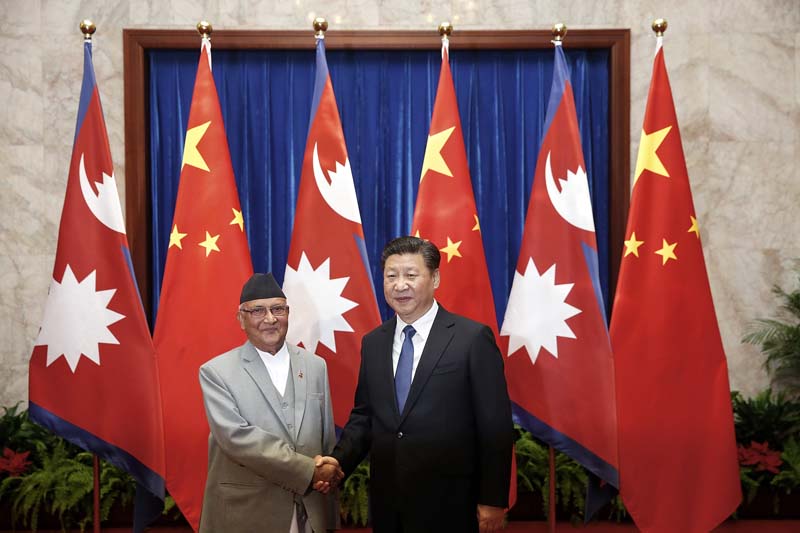Nepal, China pen transit trade treaty, nine other pacts
Kathmandu, March 21
Nepal and China today sealed 10 separate agreements and Memorandums of Understanding on using northern neighbour’s sea port facility, building a regional international airport in Pokhara and exploring the possibilities of signing a bilateral free trade agreement and finding oil and gas reserves in Nepal.
- Nepal to use China’s sea port facility
- Transit transport agreement to be reviewed every 10 years
- China to build a regional international airport in Pokhara
- China, Nepal exploring the possibilities of signing a bilateral free trade agreement
- China to explore the possibility of finding oil and gas reserves in Nepal
- China to provide economic and technical support to Nepal to implement the project on Pokhara airport
- China to distribute solar panels in Nepal’s rural areas by tapping its Climate Fund
- China to build, manage and maintain Xiarwa Boundary River Bridge at Hilsa, Humla
- Nepal, China to strengthen intellectual property system in both the countries
- Nepal, China to extend cooperation and exchange information on banking regulations
All these deals were signed in the presence of Prime Minister KP Sharma Oli and Chinese Premier Li Keqiang in Beijing.
READ ALSO
An agreement on transit transport signed between Deputy Prime Minister and Foreign Minister Kamal Thapa and Chinese Foreign Minister Wang Yi will provide Nepal access to Chinese sea port for third-country trade.
Nepal is using port located in Kolkata to export and import merchandise goods to and from third countries.
But to gain advantage from this agreement, which will be automatically reviewed every 10 years, Nepal first needs to find a Chinese port that is viable for third-country trade.
“For this, Nepal has to exchange a protocol with China, which will define the procedures that need to be followed,” said Commerce Joint Secretary Ravi Shankar Sainju.
It is also said Nepal may not be able to reap maximum benefit from the latest deal unless China’s railway link is extended to Nepal’s border point.
This is because ferrying goods via road through Tibet may not always be cost-effective and convenient.
China has already expanded its railway service to Shigatse, in Tibet, which is around 450 km from Kyirong. Kyirong lies at a distance of around 26 km from Rasuwagadi in Nepal. China plans to extend its railway service to Kyirong by 2020.
Nepal will have to enter into a separate deal with Beijing to make use of the Chinese railway service for trade purpose.
Nepal also entered into a deal with China to develop a regional international airport in the western city of Pokhara using Chinese soft loan of 1.37 billion renminbi (approximately Rs 22.20 billion).
Finance Minister Bishnu Prasad Paudel and Chinese Commerce Minister Gao Hucheng put their initials on the framework agreement to this effect.
The agreement entitles Nepal to a loan of RMB1.02 billion or 74.45 per cent of the total credit amount at an annual interest rate of two per cent. The remaining portion of the loan, or RMB355 million, would be provided without levying any interest,
Minister Paudel told The Himalayan Times through a text message from Beijing.
Of the total loan amount, RMB1.02 billion will be extended by Export-Import (EXIM) Bank of China.
Baikuntha Aryal, head of International Economic Cooperation Coordination Division at the Ministry of Finance, and Liu Liange, president of China’s EXIM Bank, signed an agreement to this effect.
Also, China has agreed to provide economic and technical support to Nepal to implement the project on Pokhara airport, which once built will be able to handle big aircraft, such as Boeing 757 and Airbus 320.
A separate agreement to this effect was signed between Minister Paudel and Chinese Minister Gao.
Nepal and China have also inked a memorandum of understanding to conduct a feasibility study on entering into bilateral Free Trade Agreement.
Trade between China and Nepal has been governed by Trade and Payment Agreement signed for the first time in 1974. Based on the findings of the feasibility study, both the governments will decide whether to sign the FTA.
China has also agreed to conduct feasibility study on extending assistance to Nepal for exploration of oil and gas reserves in the country, distribute solar panels in Nepal’s rural areas by tapping its Climate Fund, and build, manage and maintain Xiarwa Boundary River Bridge at Hilsa, Humla.
Among others, Nepal and China signed memorandums of understanding to strengthen intellectual property system in both the countries, and extend cooperation and exchange information on banking regulation.






